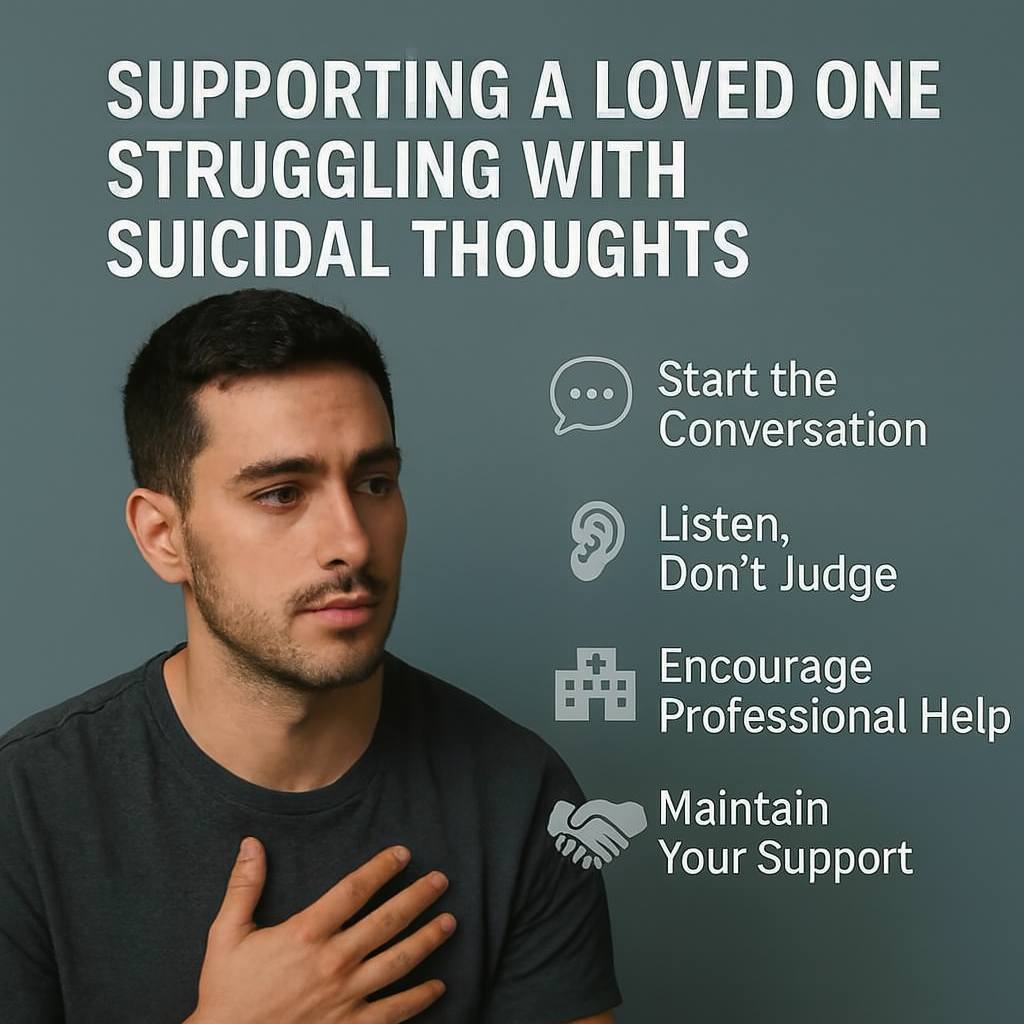Supporting a Loved One Struggling with Suicidal Thoughts: Key Strategies and Evidence-Based Recommendations
Introduction
Supporting a loved one who is struggling with suicidal thoughts or behaviors is a daunting yet profoundly important task. The impact of emotional support and understanding cannot be overstated. As individuals at risk of suicide often feel isolated and hopeless, the role of friends, family, and peers becomes crucial in providing emotional relief and facilitating access to necessary professional support. This article explores evidence-based strategies for providing effective support to individuals experiencing suicidal ideation and highlights the importance of creating a safe, non-judgmental space for conversation.
Start the Conversation: Addressing Suicidal Thoughts Directly
One of the most common misconceptions surrounding suicide prevention is that asking someone about suicidal thoughts might increase the risk. Contrary to this belief, initiating an open and non-judgmental conversation can often have the opposite effect, providing relief and the opportunity for intervention (Van Orden et al., 2010). Asking directly about suicidal thoughts can serve as a critical gateway for offering support, alleviating the individual's emotional distress, and helping them feel understood rather than isolated.
Studies indicate that individuals who are at risk of suicide frequently feel ashamed or reluctant to disclose their feelings, fearing the stigma or judgment associated with suicide (Batterham et al., 2013). By engaging in a compassionate and straightforward conversation, you can create a sense of safety that encourages the individual to express their struggles. When addressing the topic, it is essential to use gentle, direct language, such as, "I've noticed you're struggling—are you thinking about hurting yourself?" These questions, when asked with sincerity, can act as an invitation for the person to share their thoughts, potentially saving lives by intervening at a critical moment (Joiner, 2005).
Listen, Don’t Judge: Validation is Key
A fundamental aspect of supporting someone with suicidal thoughts is offering a compassionate, non-judgmental space for them to express their emotions. Individuals experiencing suicidal ideation often feel misunderstood and disconnected from others. Therefore, actively listening without trying to fix the situation immediately is essential. The goal is to acknowledge their feelings without minimizing or invalidating their experience (Ribiero et al., 2016).
Psychological studies have shown that validating the emotional experience of those at risk for suicide can significantly reduce their sense of isolation. Phrases like, “That sounds incredibly hard,” or “I’m here for you,” can go a long way in creating a connection. Avoid dismissing their feelings with phrases like “It’s not that bad,” or “Others have it worse,” as these can further alienate the person and worsen their sense of hopelessness. Instead, the focus should be on showing empathy and offering unconditional support (Ribiero et al., 2016).
Encourage Professional Help: Connecting to Crisis Resources
While emotional support is essential, professional intervention plays a critical role in suicide prevention. Encouraging someone to seek professional help—whether through therapy, counseling, or a crisis support line—is vital. Research consistently shows that individuals experiencing suicidal ideation often benefit significantly from therapeutic interventions, such as Cognitive Behavioral Therapy (CBT) and Dialectical Behavior Therapy (DBT), which have been proven to reduce suicidal thoughts and behaviors (Gould et al., 2003).
It is essential to emphasize that if someone is in immediate danger or has a plan to harm themselves, they should not be left alone. Immediate intervention through contacting emergency services, a crisis helpline, or a healthcare provider is paramount. The National Suicide Prevention Lifeline (2021) recommends that individuals in crisis be accompanied by someone who can help them navigate the process of accessing urgent care.
Maintain Your Support: The Importance of Follow-Up
Providing consistent emotional support and regularly checking in on someone who is struggling with suicidal thoughts is crucial in maintaining their sense of worth and hope. Suicide prevention is a long-term commitment, and ongoing communication reinforces the individual’s belief that they are valued and not alone. Studies have shown that follow-up contact—whether through phone calls, texts, or in-person visits—significantly reduces the risk of suicide, particularly among individuals who have previously attempted suicide (Gould et al., 2003).
Maintaining a presence of support communicates to the person that their life is important, even if they cannot see their own value at the moment. Simple acts of kindness, continued emotional check-ins, and reinforcing the idea that there is help available can significantly impact their decision to seek help and reduce the risk of a suicide attempt (Kleiman et al., 2017).
Conclusion: Supporting a Loved One with Compassion and Understanding
Supporting someone with suicidal thoughts requires a delicate balance of compassion, patience, and understanding. While it can be emotionally challenging, your support can be a critical factor in helping them navigate their pain and seek professional care. By engaging in direct conversations about their struggles, listening without judgment, encouraging professional intervention, and maintaining ongoing support, you can help create a safety net that might ultimately save their life. It is essential that, as a society, we move beyond the stigma surrounding mental health and suicidal ideation to provide the necessary support and resources for those who are struggling.
References
Van Orden, K. A., et al. (2010). The interpersonal theory of suicide. Psychological Review, 117(2), 575–600. https://doi.org/10.1037/a0018697
Batterham, P. J., et al. (2013). The role of social support in suicide prevention. Australian & New Zealand Journal of Psychiatry, 47(7), 666-672. https://doi.org/10.1177/0004867413490327
Joiner, T. E. (2005). Why People Die by Suicide. Harvard University Press. https://www.hup.harvard.edu/catalog.php?isbn=9780674025493
Ribiero, J. D., et al. (2016). Emotional and cognitive predictors of suicidal thoughts. Journal of Abnormal Psychology, 125(3), 484–495. https://doi.org/10.1037/abn0000159
Gould, M. S., et al. (2003). Psychological interventions for suicide prevention: A review of the evidence. American Journal of Psychiatry, 160(1), 29–37. https://doi.org/10.1176/appi.ajp.160.1.29
National Suicide Prevention Lifeline (2021). What to do if someone is at risk of suicide. https://suicidepreventionlifeline.org
Kleiman, E. M., et al. (2017). The impact of follow-up contact on suicide risk: A systematic review. Journal of Affective Disorders, 218, 100–112. https://doi.org/10.1016/j.jad.2017.04.032

